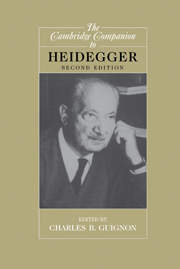Book contents
- Frontmatter
- Introduction
- 1 The question of being: Heidegger’s project
- 2 Reading a life: Heidegger and hard times
- 3 The principle of phenomenology
- 4 Time and phenomenology in Husserl and Heidegger
- 5 Laying the ground for metaphysics: Heidegger’s appropriation of Kant
- 6 Heidegger and the hermeneutic turn
- 7 Engaged agency and background in Heidegger
- 8 Death, time, history: Division II of Being and Time
- 9 Truth and the essence of truth in Heidegger’s thought
- 10 Authenticity, moral values, and psychotherapy
- 11 Heidegger, Buddhism, and deep ecology
- 12 Heidegger and theology
- 13 Heidegger on the connection between nihilism, art, technology, and politics
- 14 The fourfold
- Bibliography
- Index
- Series List
14 - The fourfold
Published online by Cambridge University Press: 28 March 2007
- Frontmatter
- Introduction
- 1 The question of being: Heidegger’s project
- 2 Reading a life: Heidegger and hard times
- 3 The principle of phenomenology
- 4 Time and phenomenology in Husserl and Heidegger
- 5 Laying the ground for metaphysics: Heidegger’s appropriation of Kant
- 6 Heidegger and the hermeneutic turn
- 7 Engaged agency and background in Heidegger
- 8 Death, time, history: Division II of Being and Time
- 9 Truth and the essence of truth in Heidegger’s thought
- 10 Authenticity, moral values, and psychotherapy
- 11 Heidegger, Buddhism, and deep ecology
- 12 Heidegger and theology
- 13 Heidegger on the connection between nihilism, art, technology, and politics
- 14 The fourfold
- Bibliography
- Index
- Series List
Summary
Among the many mysteries surrounding “the fourfold” is the almost total absence of any attempt by Heidegger scholars to explain what it is. Usually the topic doesn't even make it to the index, and even when it does, it does so only in virtue of statements like “this conception [of the fourfold] is developed in a way one can only call mythic, and its philosophical import is therefore far from clear,” which is not really very helpful. Baffled by Heidegger's poetic brevity, commentators have consigned it to the silence of the too-hard basket.
Yet without understanding the fourfold - the fourfold of earth, sky, gods, and mortals - one can understand almost nothing of later Heidegger. Heidegger says that “dwelling,” as he calls it, is the human “essence” (QCT 28, P 257, PLT 213 ff.). But to dwell is to “belong within the fourfold of sky and earth, mortals and divinities” (QCT 49; compare PLT 149). He also says that the fourfold is what “we call the world” (PLT 179). Without understanding the fourfold, therefore, one can understand neither later Heidegger's conception of the human being nor his conception of “world.”
- Type
- Chapter
- Information
- The Cambridge Companion to Heidegger , pp. 373 - 392Publisher: Cambridge University PressPrint publication year: 2006
- 14
- Cited by



